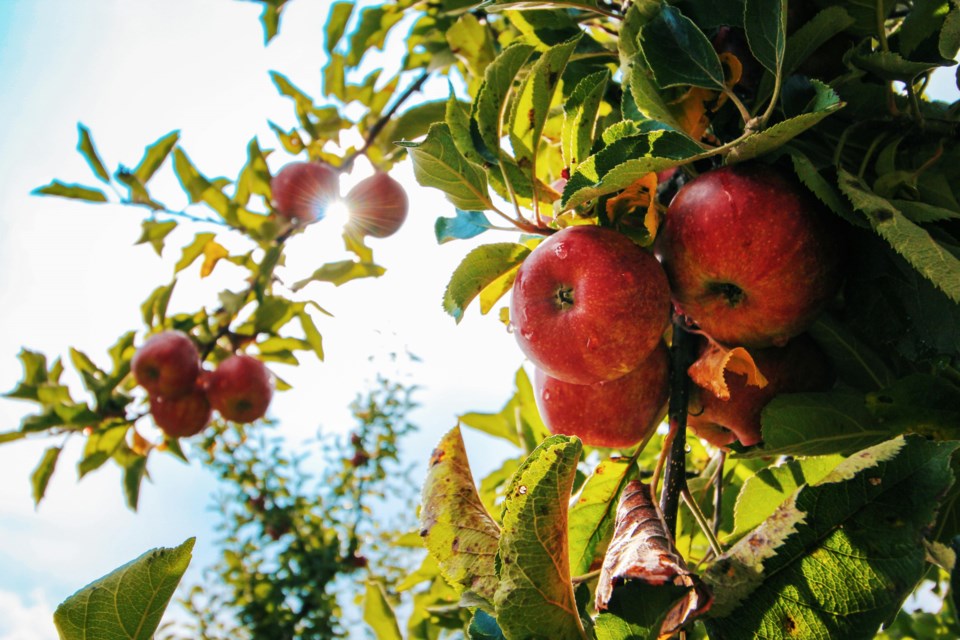COVID showed us we have issues if the ships don’t come in. U.S. President Donald Trump’s tariff threats show us we can’t rely on the ships getting out. That leaves us with one dependable partner: ourselves.
If we were an introverted nation, this wouldn’t be an issue. But it appears we are extreme extroverts who can’t stand our own company.
We grow apples — more than our domestic consumption. Good ones, too. But we oversell our domestic production, requiring us to turn around and import $209 million worth of apples from the United States, as well as nations as far away as Chile, South Africa, New Zealand, Italy and China.
At the Superstore in Prince George there is Australian beef you can buy, even though we have a large local cattle ranching industry producing superior beef that never goes out of season. Canada currently produces around 1.4 million tonnes of beef — almost half a million more tonnes than we consume. Nevertheless, we oversell it, requiring us to then import 214,000 tonnes of beef back again — half of it from the U.S., but also beef from Uruguay, New Zealand, Brazil and, of course, Australia.
I could go on and on with this. It’s sort of like all the logging trucks we see on public roads driving past each other with the exact same product.
I guess we just like to move stuff around and hammer the public highways for the sake of moving stuff around — a nervous quirk of our economy. Maybe the beef tastes better the further it flies.
The official explanation is found in fancy words like “arbitrage,” “quality differentiation,” “market segregation” and “comparative advantage.”
But at the end of the day, we have a complex array of rules, regulations and subsidies that prioritize big export-driven industries and unnecessary, redundant global economic integration.
We have an entire federal Crown corporation — the Canadian Commercial Corporation — dedicated to tying Canadian producers into foreign markets. We have a Department of Export Promotion, International Trade and Economic Development which annually dedicates $420 million to expanding Canadian trade. Almost all commodity-related federal departments have a strong focus on exports in their mission statements. We have massive public subsidies for port infrastructure to lock us into more trade and induce self-inflicted economic damage by further reducing the cost of cheap offshore imports.
Meanwhile, other than the nearly $3 billion we spend on our supply-managed Canadian dairy sector, there is next to nothing to help local producers access Canadian markets. If you scour the list of provincial and federal agriculture grants and programs, there is only one program for local food security — the $10 million-a-year Local Food Infrastructure Fund, about a quarter of the $37 million we spend on the CanExport program to encourage the export of Canadian produce. And this doesn’t include what we spend on Export Navigator, AgriAssurance and AgriMarketing — a few of the many programs aimed at helping producers export food.
And what’s the point of spending $10 million on local food infrastructure when the government giveth with one hand and taketh with the other?
People may remember the government shut down most of our local beef processing — which had provided us with self-sufficiency and local beef. They forced most of them out of business, making it cost-prohibitive, while increasing the domination of feedlots and the two huge foreign-owned corporations that conduct over 90 per cent of our beef processing in this country at three locations.
And the supply management of egg and dairy industries — a good idea in theory — costs us billions, yet has allowed Prince George’s local dairies and egg farms to get swallowed up by Lower Mainland megacorps. We lost our self-sufficiency there, too, thanks to government policies favouring consolidation.
Now the government wants to force Prince George vegetable producers to operate under the auspices of a Lower Mainland-controlled marketing board — which will likely deny them access to local supermarkets.
Our governments want globally competitive big industries. They don’t want little independent mom-and-pop producers to get in the way. The unofficial policy of North American agriculture — like the rest of the economy — is “get big or get out,” as American secretary of agriculture Earl Butz once famously said before he initiated a set of policies that effectively wiped out the small American farmer. We followed suit up here. If you look at the “efficiencies defence,” also known as Section 96 of the Competition Act, which was only repealed in 2023, having huge corporations swallow up small competition was legal — so long as it satisfied the gods of efficiency.
At the root of all this is the obsession with GDP. Maximizing exports maximizes GDP. To win this game, the argument goes, we need big, efficient global players to compete on the world stage. To practise self-sufficiency, you need import substitution — and the books tell us this is bad for GDP.
And that, apparently, is all that matters.
I’m not sure how spending a bunch of money sending our apples thousands of kilometres one way and buying the same thing from the other side of the world is good for GDP — let alone society or the planet — but that’s what the textbooks say, and that’s what our government is hell-bent on believing.
With Trump showing the fragility of global trade relationships, it might be time to write some new textbooks that recognize it’s OK to be an introvert.
Self-sufficiency has value.



